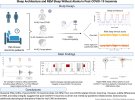Sleep Architecture and REM Sleep Without Atonia in Post-COVID-19 Insomnia
STUDY OBJECTIVES
Insomnia associated with COVID-19 infection is a common complaint in long-COVID. Studies to date have predominantly examined post-COVID-19 sleep disturbances with questionnaires. We aimed to investigate whether there are distinctive polysomnographic findings in post-COVID-19 insomnia compared to non-COVID-related chronic insomnia.
METHODS
We included 150 patients with chronic insomnia, stratified into three groups: post-COVID-19 insomnia (n = 50), chronic insomnia during the pandemic without a history of COVID-19 infection (n = 50), and pre-pandemic chronic insomnia (n = 50). All patients underwent one-night video-polysomnography (v-PSG). The sleep architecture, respiratory variables and REM sleep without atonia (RWA) were compared across the groups.
RESULTS
Classical polysomnographic variables showed no significant differences across groups with regard to total sleep time, sleep efficiency, sleep stage percentages, and the apnea-hypopnea index. Post-COVID-19 insomnia patients had significantly increased RWA at both the chin and the flexor digitorum superficialis (FDS) (p=.020 for both), and higher nocturnal heart rates (p=.046). Sleep-bout analysis indicated shorter sustained N3-sleep periods (p=.001) and longer onset to stable REM-sleep (p=.016) in the post-COVID-19 insomnia group. Although sleep transitions did not withstand multiple comparison corrections, they revealed a trend towards decreased N3-sleep continuity and increased probabilities of transitioning to lighter stages (N3 → N3: unadjusted-p=.012; REM → N1: unadjusted-p=.027) in the post-COVID-19 insomnia.
CONCLUSIONS
Classical PSG profile of post-COVID-19 insomnia does not differ from non-COVID-related chronic insomnia. However, subtle differences in RWA and sleep integrity suggest that post-COVID-19 insomnia is driven not merely by pandemic-related stress factors but by additional physiological alterations linked to viral CNS involvement.
Web | PDF | Sleep | Open Access
Ibrahim, Abubaker; Cesari, Matteo; Tang, Qi; Aktan Süzgün, Merve; Brandauer, Elisabeth; Holzknecht, Evi; Wachter, Alexander; Anselmi, Victoria; Heidbreder, Anna; Stefani, Ambra; Högl, Birgit
STUDY OBJECTIVES
Insomnia associated with COVID-19 infection is a common complaint in long-COVID. Studies to date have predominantly examined post-COVID-19 sleep disturbances with questionnaires. We aimed to investigate whether there are distinctive polysomnographic findings in post-COVID-19 insomnia compared to non-COVID-related chronic insomnia.
METHODS
We included 150 patients with chronic insomnia, stratified into three groups: post-COVID-19 insomnia (n = 50), chronic insomnia during the pandemic without a history of COVID-19 infection (n = 50), and pre-pandemic chronic insomnia (n = 50). All patients underwent one-night video-polysomnography (v-PSG). The sleep architecture, respiratory variables and REM sleep without atonia (RWA) were compared across the groups.
RESULTS
Classical polysomnographic variables showed no significant differences across groups with regard to total sleep time, sleep efficiency, sleep stage percentages, and the apnea-hypopnea index. Post-COVID-19 insomnia patients had significantly increased RWA at both the chin and the flexor digitorum superficialis (FDS) (p=.020 for both), and higher nocturnal heart rates (p=.046). Sleep-bout analysis indicated shorter sustained N3-sleep periods (p=.001) and longer onset to stable REM-sleep (p=.016) in the post-COVID-19 insomnia group. Although sleep transitions did not withstand multiple comparison corrections, they revealed a trend towards decreased N3-sleep continuity and increased probabilities of transitioning to lighter stages (N3 → N3: unadjusted-p=.012; REM → N1: unadjusted-p=.027) in the post-COVID-19 insomnia.
CONCLUSIONS
Classical PSG profile of post-COVID-19 insomnia does not differ from non-COVID-related chronic insomnia. However, subtle differences in RWA and sleep integrity suggest that post-COVID-19 insomnia is driven not merely by pandemic-related stress factors but by additional physiological alterations linked to viral CNS involvement.
Web | PDF | Sleep | Open Access

